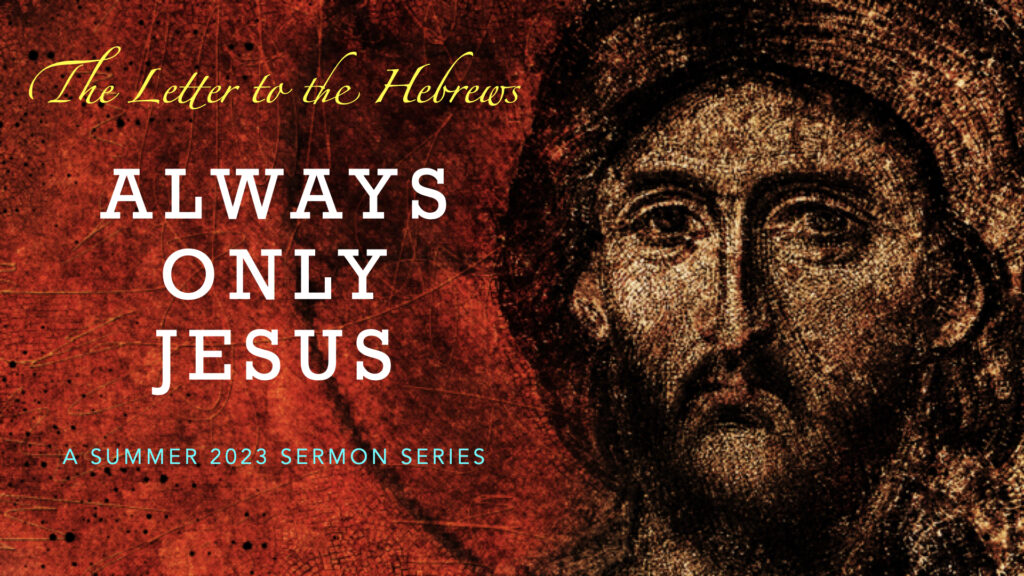
April 2025 Pastor’s Corner — The Fear of the Lord

“My name will be great among the nations, from the rising to the setting of the sun. In every place incense and pure offerings will be brought to my name, because my name will be great among the nations,” says the LORD Almighty. — Malachi 1:11
One evening several weeks ago, my daughter came to me with a question. She had just read the story of Moses and the burning bush (Exodus 3). When God speaks to Moses out of the burning bush we’re told that “Moses hid his face, for he was afraid to look at God.” (Exodus 3:6) My daughter didn’t understand why Moses would’ve been afraid. Since our God is a loving God (Jeremiah 31:3, one who is merciful and gracious (Psalm 86:15), who treats us with tenderness (Luke 1:78) and gentleness (1 Kings 19:12), why would we be afraid of Him?
I think a lot of us approach God in a similar manner. We have heard so much about the love and grace of God that fear has fallen by the wayside. After all, “God gave us a spirit not of fear but of power and love and self-control.” (2 Tim. 1:7) But I think we are misunderstanding how the Bible is using the word “fear” when it comes to our relationship with God. There is “fear” in the sense of terror and fright (which is what most of us think of), but there is also “fear” in the sense of awe and reverence. As the Dictionary of Biblical Imagery explains, “The fear of God is distinct from the terror of him that is also a biblical motif. Encompassing and building on attitudes of awe and reverence, it is the proper and elemental response of a person to God… The very frequency of the references signals that the fear of God is central to biblical faith, and the relative absence of this ancient way of thinking in our culture should give us pause.”
If we do not have a proper awe and reverence for God, then we lose just how radical and powerful His grace, mercy and love truly are. The God we serve is an all-powerful, almighty, glorious, holy, righteous God. He spoke, and stars and planets burst forth (Genesis 1:14). He moves His hand, and waters part (Exodus 14:21-25). He measures galaxies with the width of His hand (Isaiah 40:12). He binds the Pleiades and looses the cords of Orion (Job 38:31). He gives orders to the morning (Job 38:12), and maintains the storehouses of snow and lightning (Job 38:22-30). He is a God who rides thunderstorms to rescue His children (Psalm 18, specifically verses 6-15). When God says “My name will be great among the nations,” (Malachi 1:11) He does not do so as a braggart but as the only One who can rightly claim and demand such greatness. When we think of our God, a fearful awe and reverence is an essential component. “It is a dreadful thing to fall into the hands of the living God.” (Heb. 10:31)
The warning to fear God echoes in both the Old and New Testaments. “Consider then and realize how evil and bitter it is for you when you forsake the LORD your God and have no awe of me,” declares the Lord, the LORD Almighty.” (Jer. 2:19) When we think of God’s goodness, fearing Him should be included: “I will make an everlasting covenant with them: I will never stop doing good to them, and I will inspire them to fear me, so that they will never turn away from me.” (Jer. 32:40) And Jesus Himself, God incarnate, says, “But I will warn you whom to fear: fear him who, after he has killed, has authority to cast into hell. Yes, I tell you, fear him!” (Luke 12:5) We focus so much on Jesus as “gentle, meek and mild” that we forget the disciples quaked in terror of Him after He calmed the storm (Mark 4:35-41). Even at the end of history, when Jesus returns in power and glory and evil is destroyed forever, when everything sad comes untrue and every broken thing is made whole, we are told, “Fear God and give him glory, because the hour of his judgment has come. Worship him who made the heavens, the earth, the sea and the springs of water.” (Rev. 14:7)
It is because our God is very much a God to be feared (first in awe and reverence, but also with a dose of terror and fright) that the good news of His grace and mercy is so very good indeed. That, for those who accept Jesus Christ as Lord and savior, there is no longer need to fear God’s righteous judgment. All of the things the Bible says of God’s gentleness and tenderness, His kindness and His mercy, His steadfast lovingkindness, are all true, and made all the more awe-ful and awe-some because of His might, power and majesty. Grace is all the more amazing when we maintain a healthy and appropriate fear of the Lord. As we continue to draw ever closer to the darkness of Good Friday and the triumph of Easter Sunday, may the fear of the Lord deepen your gratitude and faith this Lenten season.
The fear of the LORD is the beginning of knowledge,
but fools despise wisdom and discipline. — Proverbs 1:7
Blessings,
Rev. David Garrison
Read more...
February 2025 Mills’ Musings — Happy Birthday, Nicene Creed!
If someone does make a cake for the occasion, I’d like to be there when the candles are lit. The occasion is the 1700th birthday of the Nicene Creed. While I doubt anyone will make a cake, at least not one with 1,700 candles, I believe the event is certainly worth celebrating. Here is a short look at why.
Early Creeds
Our English word “creed” comes from the Latin credo, which means, “I believe.” A creed, broadly defined, is a statement of what it is that I believe. More technically, in the Christian tradition a creed is a concise, formal, and authorized statement of essential Christian doctrine.
The earliest Christian creed was spoken by Peter and recorded in Mark 8:29. At Caesarea Philippi, in response to Jesus’ question, “But who do you say that I am,” Peter, inspired by the Holy Spirit, replied, “You are the Christ.” Writing to the Philippians some three decades later, Paul concluded his marvelous Hymn to Christ with what remains the foundational creed of Christianity, “Jesus Christ is Lord” (Phil. 2:11).
But after the last apostle had died, after the canon of Scripture had been closed, Christians began to sense a need for clear and succinct summaries of the basic doctrines of their faith. So they drew on the language of Scripture to formulate brief statements of their core beliefs. The most prominent of these – the Apostles’, Nicene, and Athanasian Creeds, are still accepted (with some variations) by the Roman Catholic, Eastern Orthodox, and most Protestant denominations.
Creeds Today
Today, many congregations still make use of these creeds along with their longer, younger cousins, confessions. For example, the Evangelical Presbyterian Church, to which Northminster belongs, uses the Westminster Confession of Faith and its catechisms as our doctrinal standards. In Sunday morning worship, we often recite in unison sections of this Confession. Other Sundays we say the Nicene or Apostles’ Creed. These public affirmations of our faith remind us of what we believe about the nature and work of God the Father, God the Son, God the Holy Spirit, and the Church.
Creeds also have uses outside Christian worship. In his book This You Can Believe, John Brokhoff describes three purposes these historic creeds and confessions continue to serve in the Church today. The three purposes are: definition, defense and declaration.
Definition, The first purpose of creeds, Brokhoff writes, “is to define the Christian faith. What does a Christian believe? Are your beliefs in harmony with the Scriptures and the Church’s teachings?” Once we have learned Nicene Creed, we will always have an answer to fundamental questions about our faith.
Defense is the second purpose of creeds. Even before the last apostle had died, some in the Church were attempting to redefine the Christian faith. By 325, a young pastor named Arius was causing divisions in the Church by denying the Church’s historic teaching that Jesus was both fully God and fully human. Crafting language we still use today, the authors of the Nicene Creed decisively refuted that false teaching.
The third purpose of creeds is Declaration. Knowing the Nicene Creed helps us fulfill Jesus’ command to be his witnesses. The Creed is a positive, fearless declaration of the essentials of our faith. It is not just for church on Sunday mornings. We can use it to declare our faith in our everyday lives.
Happy Birthday, Nicene Creed. And someone please let me know about the cake. It would give a lot of light.
Read more...

October 2024 Pastor’s Corner — Falling Like A Seed

“The hour has come for the Son of Man to be glorified. Truly, truly, I say to you, unless a grain of wheat falls into the earth and dies, it remains alone; but if it dies, it bears much fruit. Whoever loves his life loses it, and whoever hates his life in this world will keep it for eternal life. If anyone serves me, he must follow me; and where I am, there will my servant be also. If anyone serves me, the Father will honor him.” — John 12:23-26 ESV
As I’ve been contemplating and praying through this passage recently, something particular stood out to me. This teaching from Jesus is given on Palm Sunday, shortly after the Triumphant Entry. Having seen the festive procession as Jesus entered Jerusalem and the Temple Mount, some Greeks “came to Philip, who was from Bethsaida in Galilee, and asked him, ‘Sir, we wish to see Jesus.’ Philip went and told Andrew; Andrew and Philip went and told Jesus.” (John 12:21-22 ESV) The passage above is Jesus’ response to their request. If you pause for just a moment and think about it, it’s a really, really weird answer. They ask to see Jesus, and Jesus says, “Unless a seed die, it can not bear much fruit.” Ok. Right. Good to know. But can you have a chat with these folks or not?
The entirety of his answer comes in John 12:23-36, with verse 32 explaining and expanding verse 24: “24Truly, truly, I say to you, unless a grain of wheat falls into the earth and dies, it remains alone; but if it dies, it bears much fruit… 32And I, when I am lifted up from the earth, will draw all people to myself.” What was surely confusing to the disciples and the Greeks who wanted to see Jesus is crystal clear to us: In order for the Greeks, or anyone actually, to see see Jesus truly, He first needed to die and rise from the dead. Through the death of the one seed, Jesus Christ, the fruit of the Gospel exploded throughout the world.
There’s a lot to unpack in these short verses, and maybe we’ll do that over the next few months, but for now, consider this. Autumn, for all of its beauty, is a season of dying. The leaves change color because they’ve stopped producing chlorophyll; they’ve started to die. The seeds the trees have been growing all year long fall to the ground. The crops have finished their season of growth and are starting to ripen. The harvest is being gathered in. And yet none of that is an end. All of that is used to begin the process of new life and growth. That new life and growth won’t be evident until months of gestation have passed, but life, and life abundant, will burst forth. Watching the leaves fall it seems like the promise of that new life is an eternity away, but once spring comes ‘round it will be as if a mere moment has passed.
God created the natural world to work the way it does because it illustrates His truth (Psalm 19:1-4). In God’s great redemptive work, nothing is wasted. Even death, that which seems like the ultimate and permanent ending, becomes the seed and soil that nurtures exponentially more life. There is great comfort in knowing that when we die there will be a double blessing: We will be blessed by rising to eternal life with Jesus (1 Cor. 15:52-54) and the Kingdom of God will be blessed as God takes our dying and uses it to glorify Himself and bring forth abundant new life (John 12:27-28).
The future is always scary, because from our finite perspective it’s so uncertain. But it isn’t, really. God is not just God of the past and present, He is God of the future as well. What seems uncertain and constantly changing for us is sure and certain for God. It is because God holds the future in His hands that we can know with absolute certainty nothing that happens will go to waste, not even death. Leaves die and fall and decompose to provide the nutrients that the seeds that fell need in order to give life to much new fruit. What is true in nature is true in us. And what is true in us is true in the Church as well.
For we know that the whole creation has been groaning together in the pains of childbirth until now. And not only the creation, but we ourselves, who have the firstfruits of the Spirit, groan inwardly as we wait eagerly for adoption as sons, the redemption of our bodies. For in this hope we were saved. Now hope that is seen is not hope. For who hopes for what he sees? But if we hope for what we do not see, we wait for it with patience. — Rom. 8:22-25 ESV
Blessings,
Rev. David Garrison
Read more...

June 2023 Pastor’s Corner – Always Only Jesus

Long ago, at many times and in many ways, God spoke to our fathers by the prophets, but in these last days he has spoken to us by his Son, whom he appointed the heir of all things, through whom also he created the world. He is the radiance of the glory of God and the exact imprint of his nature, and he upholds the universe by the word of his power. After making purification for sins, he sat down at the right hand of the Majesty on high, having become as much superior to angels as the name he has inherited is more excellent than theirs. — Hebrews 1:1–4
I had a conversation with a friend a few weeks ago about faith and spirituality. He was sharing with me the story of his own faith journey and how he’d come to believe in the divine spirit, that sense of love, peace and acceptance that is so essential to human existence. It was an impersonal spirit that accepts no matter who we are, loves no matter what we’ve done, is always present no matter how far we run. It was an interesting conversation because it was so full of half truths, while missing some of the most important truths of all. It’s actually kind of marvelous, because you get all the benefits of a personal relationship with God, without any of the pesky things that come along with a God that is actually intimately, personally present in our lives and actually expects anything of us.
We live in a time where “spirituality” is perhaps more important to people now than ever before. It’s a somewhat unexpected development, given modernity’s efforts to eradicate the spiritual from all areas of life. Where many feared what postmodernism might do to matters of faith, it turns out that the door has been opened in many unexpected ways. The door hasn’t just been opened, it’s actually been flung wide, so that it’s almost an “anything goes” spirituality. When people talk about their faith and spiritual journey, like my friend above, it’s almost always a belief in a non-specific, impersonal “deity” that only loves and never rebukes, always accepts and never holds accountable. If we’re honest, many of us have allowed these kinds of ideas to get woven into the fabric of our faith as well. While we say it’s “always only Jesus,” in practice our faith is a lot of “Jesus and…”
That’s why the Letter to the Hebrews was written. As Eugene Peterson writes,
In the letter, it is Jesus and angels, or Jesus and Moses, or Jesus and priesthood. In our time it is more likely to be Jesus and politics, or Jesus and education, or even Jesus and Buddha. This letter deletes the hyphens, the add-ons. The focus becomes clear and sharp again. God’s action in Jesus. And we are free once more for the acts of faith, the one human action in which we don’t get in the way but on the Way.
This summer, we’re going to get back to Always Only Jesus, with the book of Hebrews as our guide. We’ve all added on to our faith, probably without even realizing it. Let’s shed the extra baggage and get back to living the free and light life of faith Jesus died to bring us. We look forward to worshipping with you.
Now may the God of peace who brought again from the dead our Lord Jesus, the great shepherd of the sheep, by the blood of the eternal covenant, equip you with everything good that you may do his will, working in us that which is pleasing in his sight, through Jesus Christ, to whom be glory forever and ever. Amen.
— Hebrews 13:20-21
Blessings,
Rev. David Garrison
Read more...

March 2023 Pastor’s Corner — Stay Thirsty

“As a deer pants for flowing streams,
so pants my soul for you, O God.
My soul thirsts for God,
for the living God.
When shall I come and appear before God?”
— Psalm 42:1–2
As many of you know, I am an avid coffee drinker. While medical tests have never proved it, there have been times I’ve been pretty sure there’s more coffee running through my veins than blood. It’s not so much about the caffeine (caffeine doesn’t really wake me up, it just keeps me from going to sleep), I just simply love the taste and the smell.
For no particular reason a couple of weeks ago, I didn’t drink any coffee for three or four days and instead drank several glasses of water. Just water, with nothing added. A few days later, I noticed that my quality of sleep had significantly improved and that some of the aches and pains that come with middle age had lessened. The only thing I had changed was decreasing the amount of coffee consumed each day. It’s not that I had been dehydrated; I was definitely getting plenty of fluids. There’s simply no substitute for a nice, cool glass of perfectly mixed dihydrogen monoxide.
I’ve often said that going to church for Christians is the air we breathe. I think that was the wrong analogy, because you can only go without air for a few minutes. However, one can live and exist just fine without water. As long as you’re still getting fluids (coffee, tea, your carbonated beverage of choice, so on and so forth), your body will continue to function, and probably fairly decently. But if you want your body to be at its best, then we need water. You don’t need water in order to be human (most any fluid will suffice), but the human body can’t be at its best without water. For the Christian, going to church isn’t the air we breathe, it’s the water we drink. Going to church won’t make you a Christian, but I don’t know how to be a Christian without going to church.
In the Psalm at the beginning, the psalmist is in exile in a far off land. He is unable to worship at the Temple in Jerusalem; he hasn’t been able to go to church for a very, very long time. As a result, his soul is drying up. Three times in the Psalm he says his soul is “cast down within me.” In addition to sleeping better and the aches and pains lessening as I drank more water, my mind also seems a bit sharper and clearer. Who knew that sometimes depression can be eased by drinking water? The same is true spiritually. We were created to worship God, together, with the other saints, on a regular basis. We need water daily. Our spirit needs corporate worship at least weekly.
If your spiritual life seems a bit dry lately or if you’ve found your soul “thirsting for the living God,” maybe it’s because you’ve “neglected meeting together” (Hebrews 10:25) with the saints in worship, prayer and Bible study. I didn’t realize how much my body was craving pure water until I started drinking more. Sometimes, we don’t even realize how thirsty our soul is until we gather together with other believers to worship the Lord and pray together. We drink best from the well of living water when we do so together with other believers.
Jesus said to her, “Everyone who drinks of this water will be thirsty again, but whoever drinks of the water that I will give him will never be thirsty again. The water that I will give him will become in him a spring of water welling up to eternal life.” — John 4:13–14
Blessings,
Rev. David Garrison
Read more...

December 2021 Pastor’s Corner – Heavy Holidays

The disappointment, brokenness, suffering, and pain that characterize life in this present world is held in dynamic tension with the promise of future glory that is yet to come. In that Advent tension, the church lives its life. — Fleming Rutledge, Advent (pp. 7-8).
“Then I saw a new heaven and a new earth, for the first heaven and the first earth had passed away, and the sea was no more. And I saw the holy city, new Jerusalem, coming down out of heaven from God, prepared as a bride adorned for her husband. And I heard a loud voice from the throne saying, ‘Behold, the dwelling place of God is with man. He will dwell with them, and they will be his people, and God himself will be with them as their God. He will wipe away every tear from their eyes, and death shall be no more, neither shall there be mourning, nor crying, nor pain anymore, for the former things have passed away.’” (Rev. 21:1–4)
Rev.David Garrison
Read more...

November 2021 Pastor’s Corner – Dancing With The Devil

Tell me something, my friend. You ever dance with the devil in the pale moonlight? — The JokerDon’t… tempt me Frodo! I dare not take it. Not even to keep it safe. Understand, Frodo. I would use this ring from a desire to do good… But through me, it would wield a power too great and terrible to imagine. — Gandalf
Be sober-minded; be watchful. Your adversary the devil prowls around like a roaring lion, seeking someone to devour. Resist him, firm in your faith, knowing that the same kinds of suffering are being experienced by your brotherhood throughout the world. — 1 Peter 5:8–9)
Rev. David Garrison
Read more...

September 2021 Pastor’s Corner – 18 Months

It’s now been just about 18 months since this pandemic really started exploding across our country, and what a rollercoaster of an 18 months its been. There was the first few months of initial fear when everything shut down in March of 2020. But as we moved through the summer and the infection numbers in central Virginia stayed relatively low, we began to hope that things would return to normal by the fall, if not Christmas. With the return of school (although not “normal” school) in the fall, that hope continued to rise. But then as we moved into December and January, we saw a severe spike in infections in our area, and our hope began to fade. But then the vaccines became widely available, and numbers began to shrink again through the spring of 2021 – the end seemed to be in sight! Hope burned more brightly through this summer, as numbers in our area continued to decrease and plans to go back to “normal” school were put in place…but an anxiety lurked under the surface as news of highly contangious variants began to spread. And then school did begin, just last week (at the time I’m writing this). Now here we are today, on August 26, after only 6 schooldays, and all secondary schools in Amherst County are closed for a week and the Delta variant is running rampant in our area. Is this ever going to end? What do we do? How are we to hold on to hope in this midst of this rollercoaster of uncertainty?
Consider the wisdom of Psalm 40:
I waited patiently for the LORD;
he inclined to me and heard my cry.
He drew me up from the pit of destruction,
out of the miry bog,
and set my feet upon a rock,
making my steps secure.
He put a new song in my mouth,
a song of praise to our God.
Many will see and fear,
and put their trust in the LORD. (Psalm 40:1-3)
Whenever I read this Psalm, I always think of the picture of the lighthouse above. Look closely. Do you see the man standing in the doorway, completely at ease as these giant waves crash around him? He is still in the midst of the storm, but God has set him securely on the rock and protected him from harm. We would all prefer that God bring an end to this pandemic, and one day He surely will. In the meantime though, He invites us to trust Him even in the midst of the storm. Whether that storm is a pandemic, the loss of a job, a crisis of health, being persecuted for your faith, or any other number of things, the counsel is still the same. Trust in the Lord. He likely won’t remove the storm, but He will hold you safe and secure in the midst of the storm.
As we all become worn out and weary, tempted to lose hope that COVID will ever go away, hold fast to the Lord. Continue to cry out to Him and trust in Him. He might not remove the storm, but He will set your feet on the Rock of Jesus Christ and secure you. As you find His peace in the midst of the storm, may you find yourself singing a new song of praise to Him.
Blessings,
Rev. David Garrison
Read more...

July 2021 Pastor’s Corner – What If It’s Actually True?

Praise be to the God and Father of our Lord Jesus Christ, who has blessed us in the heavenly realms with every spiritual blessing in Christ. For he chose us in him before the creation of the world to be holy and blameless in his sight. In love he predestined us to be adopted as his sons through Jesus Christ, in accordance with his pleasure and will— to the praise of his glorious grace, which he has freely given us in the One he loves. In him we have redemption through his blood, the forgiveness of sins, in accordance with the riches of God’s grace that he lavished on us with all wisdom and understanding. —Ephesians 1:3–8
For this reason I kneel before the Father, from whom his whole family in heaven and on earth derives its name. I pray that out of his glorious riches he may strengthen you with power through his Spirit in your inner being, so that Christ may dwell in your hearts through faith. And I pray that you, being rooted and established in love, may have power, together with all the saints, to grasp how wide and long and high and deep is the love of Christ, and to know this love that surpasses knowledge—that you may be filled to the measure of all the fullness of God. — Ephesians 3:14–19
Rev. David Garrison
Read more...

Pastor’s Mid-Week Bible Study Begins This Week!

Read more...
